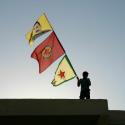 |
 |
The Pitfalls of Relying on Kurdish Forces to Counter ISIS

American over-reliance on Kurdish forces as the primary ground partner in the fight against the Islamic State of Iraq and al-Sham (ISIS) threatens the long-term success of the anti-ISIS campaign. The U.S.-led anti-ISIS coalition currently provides extensive military support to Kurds in both Iraq and Syria through weapons shipments, advisory missions, and close air support. This cooperation has enabled Kurdish forces to seize large swaths of territory from ISIS throughout 2015, including the majority of the Syrian-Turkish border and key terrain in the vicinity of Mosul. U.S. President Barack Obama lauded the gains as a demonstration of what can be accomplished “when [the U.S.] has an effective partner on the ground.” This partnership, however, faces two fundamental pitfalls that challenge broader U.S. national security objectives. First, the U.S.-led air campaign in Syria supports the expansion of the Kurdistan Workers’ Party (PKK), a designated terrorist organization that has conducted an insurgency against the Turkish state since 1984. This cooperation threatens to drive Turkey away from deeper coordination with the anti- ISIS coalition. Second, the U.S. risks fueling long-term ethnic conflict in both Iraq and Syria due to the relative empowerment of the Kurds at the expense of other local powerbrokers, often Sunni Arabs. These pitfalls could promote future regional disorder and prevent the U.S. from successfully degrading and destroying ISIS.